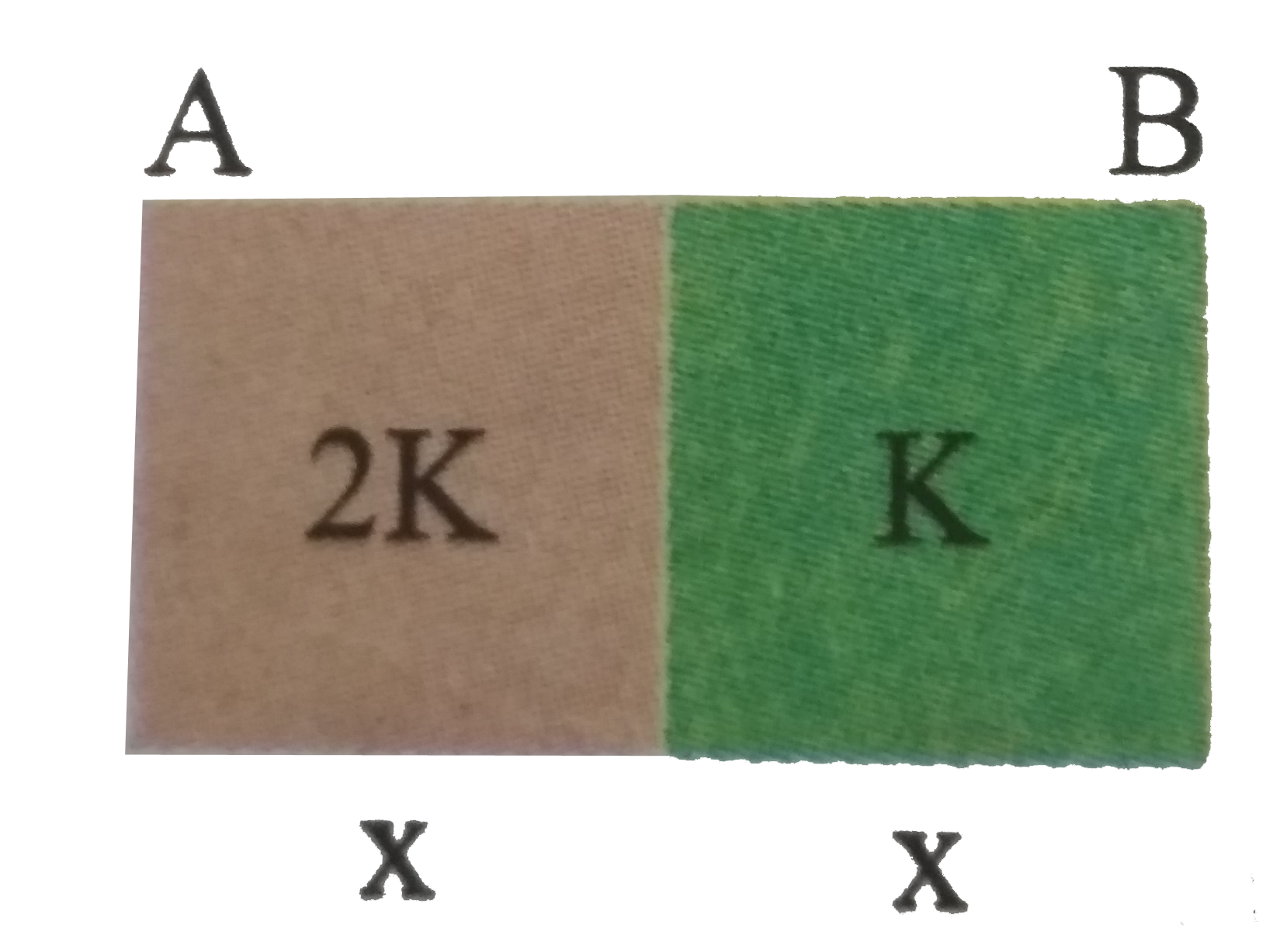A wall has two layers A and B, each made of different material. Both the layers have the same thickness. The thermal conductivity of the material of A is twice that of B . Under thermal equilibrium, the temperature difference across the wall is 36∘C. The temperature difference across the layer A is
6∘C
12∘C
18∘C
24∘C
The correct Answer is:B
Given that temperature difference across the wall is 36∘C Let temperature difference across A is Δθ then temperature difference across B is 36−Δθ
In steady state, 2KAΔθx=KA(36−Δθ)x
 .
.
Topper's Solved these Questions
- BOOK - NARAYNACHAPTER - TRANSMISSION OF HEATEXERCISE - LEVEL-III (C.W)1videos
TRANSMISSION OF HEAT
- BOOK - NARAYNACHAPTER - TRANSMISSION OF HEATEXERCISE - LEVEL- (C.W)25videos
TRANSMISSION OF HEAT
- BOOK - NARAYNACHAPTER - TRANSMISSION OF HEATEXERCISE - LEVEL - 2 (C.W)1videos
TRANSMISSION OF HEAT
- BOOK - NARAYNACHAPTER - THERMODYNAMICSEXERCISE - Exercise187videos
THERMODYNAMICS
- BOOK - NARAYNACHAPTER - UNITS AND MEASUREMENTSEXERCISE - STATEMENT TYPE QUESTION23videos
UNITS AND MEASUREMENTS
Similar Questions
A partition wall has two layers of different materials A and B in contact with each other. They have the same thickness but the thermal conductivity of layer A is twice that of layer B. At steady state the temperature difference across the layer B is 50 K, then the corresponding difference across the layer A is
View SolutionA partition wall has two layers A and B, in contact, each made of a different material. They have the same thickness but the thermal conductivity of layer A is twice that of layer B. If the steady state temperature difference across the wall is 60 K, then the corresponding difference across the layer A is
View Solution
Knowledge Check
- Question 1 - Select One
A wall has two layers A and B, each made of different material. Both the layers have the same thickness. The thermal conductivity of the material of A is twice that of B . Under thermal equilibrium, the temperature difference across the wall is 36∘C. The temperature difference across the layer A is
A6∘CB12∘CC18∘CD24∘C - Question 2 - Select One
A wall has two layers A and B, each made of different materials. Both layers are of same thickness. But, the thermal conductivity of material A is twice that of B. If, in the steady state, the temperature difference across the wall is 24∘C, then the temperature difference across the layer B is :
A8∘CB12∘CC16∘CD20∘C - Question 3 - Select One
A wall has two layers A and B each made of different materials. The layer A is 10cm thick and B is 20 cm thick. The thermal conductivity of A is thrice that of B. Under thermal equilibrium temperature difference across the wall is 35∘C. The difference of temperature across the layer A is
A30∘CB14∘CC8.75∘CD5∘C
A partition wall has two layers of different materials A and B in contact with each other. They have the same thickness but the thermal conductivity of layer A is twice that of layer B. At steady state the temperature difference across the layer B is 50 K, then the corresponding difference across the layer A is
View SolutionA wall has two layers A and B each made of different materials. The thickness of both the layers is the same. The thermal conductivity of A, KA=3KB. The temperature different across the wall is 20∘C in thermal equilibrium
View SolutionA composite slab consists of two parts of equal thickness. The thermal conductivity of one is twice that of the other. What will be the ratio of temperature difference across the two layers in the state of equilibrium ?
View SolutionIf a body A is in thermal equilibrium with three different bodies B, C and D then
View SolutionIf a body A is in thermal equilibrium with three different bodies B, C and D then
View Solution

